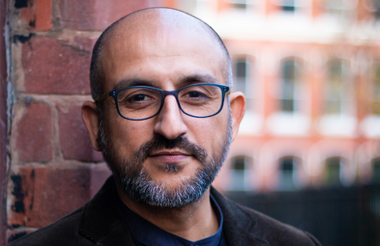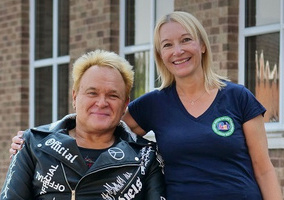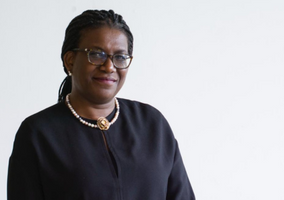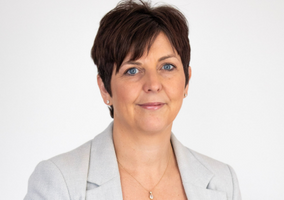Asim Lone’s background “is probably a little bit different to most CEOs” in the charity sector, as he began his career 25 years ago as a software developer.
After a period working as a web developer, Lone first joined the UK charity sector when he became a trustee of Orphan Aid, which was working in East Africa.
He used his technical skills to build the small charity a website and set up online donations, which he says “in 2002 was not a thing”.
Lone stayed at Orphan Aid for about seven years working in a group of five or so volunteers.
“It just grew and grew and became too much for us to manage as volunteers,” he says. “We always thought that we were just a bunch of amateurs basically.”
They decided to give the projects away to Human Appeal, an older charity with greater resources, before closing down Orphan Aid.
“So that was really my first foray into the charity sector, and into international development specifically, and that’s really what I cut my teeth on. I’ve always been in international development, particularly around child poverty and poverty relief but more so with a focus on longer-term development. That’s been the thing for me from the get go.”
Becoming a charity leader
After Orphan Aid closed, Lone continued working in the corporate sector, which he said “left quite a gap not working with a charity”.
Then in 2010 an opportunity arose. That same charity to which they had previously given the programmes, Human Appeal, had a change of leadership.
“They basically went on a recruitment drive, and I just somehow got an opportunity to work for that charity that we had given those projects to, so it was completely coincidental, but a really nice coincidence nonetheless.”
Lone became Human Appeal’s digital marketing manager and over the next few years held similar roles at other charities including Muslim Hands, READ Foundation UK and Royal Air Forces Association.
Then in 2022, Lone joined Charity Right initially as deputy chief executive before being promoted to CEO last year.
“I had never really seen myself as a CEO. I mean, I had aspirations of wanting to be a CEO but didn’t really have a clear route to CEO from digital marketing.
“But this opportunity came along, and this is why they were interested in talking to me about it, to essentially build this digital first vision for Charity Right.
“What we’re trying to do is create a tech charity. In the way that you’ve got tech companies, we’re trying to do something similar but within the charity space and they felt that I had the right combination of skills and experience, and for me, it felt like the right step into a CEO role.
“Adopting this digital first position is something that really speaks to me and my experiences.
“I’ve been CEO for a little bit more than a year and a half. And it’s been brilliant, haven’t regretted it at all.”
Lone says “the pace is different” at charities compared to the corporate sector.
“I’ve done a lot of thinking and reflection on this and I think it’s different because the people in the sector are different and because they’re motivated differently.”
Digital first
Lone describes the charity’s new approach as “digital first”.
“At the moment 90% of our income, probably more, comes via our website. And we’ve built our own website from the ground up.
“We’ve built our own fundraising platform, also from the ground up, so we don’t use fundraising platforms like JustGiving or GoFundMe or anything like that.”
He says this is “simply because we know the experience that we want to provide to our donors” the charity has also built its data flow behind the transaction “in a very particular way to support our internal processes as well”.
Every Ramadan the charity enhances its peer-to-peer fundraising, whereby 600-700 people create a page on the charity’s platform and go to their friends and funding network and fundraise.
“The engagement is a non-digital engagement, but the transaction that’s happening is a digital transaction.”
The charity also has plans to develop new digital products that will service different kinds of motivations.
For example, there’s a growing motivation for people to honour their loved ones that have died and Lone says there “seems to be an opportunity for us to be able to create some kind of fundraising experience for them to be able to honour”.
Recently somebody whose sister passed away created a page in her name and they raised a significant amount of money because they went to their friends and family.
“It was quite emotional for them, for that group of individuals. They came together and raised a significant amount of funds in honour of her.”
Internally, Lone says the charity is undergoing “an extensive digital transformation programme” involving “every aspect of the organisation” including CRM, financial systems, HR and governance systems.
The charity also works fully remotely. When it was set up, the charity had a physical office in Bradford but the team now works in different regions and sees each other about twice a year in person.
Muslim ethos
Charity Right is run with a Muslim ethos, and has built the brand on fundraising within Ramadan, but Lone is keen to reach new audiences in the future.
“If you’ve not done a Ramadan campaign, then really there’s no campaign that comes close,” he says, with the £3m charity generating about 70% of its income for the whole year in that 30-day period, “so it’s intense”.
“Ramadan contributes a significant portion of our year’s income. And so, as a result, the messaging that we use, the brand positioning that we use, is a Muslim-led positioning language. That said, what we do is actually we feed children.”
Repositioning the brand
Lone is keen to reposition Charity Right as a brand to start reaching new audiences but he does not plan to change its name.
“I think if we were to go out to a mainstream audience and say ‘hey, let’s feed children’, I think that would be well received, right?
“So, we shouldn’t be limiting ourselves to any one particular group whether that be a faith or an ethnic group, or whatever the case may be, because I think what we do is quite universal.
“Right now, our positioning absolutely is a Muslim charity, simply because of how we’ve built the organisation, but I don’t think that’s our future.
“I think we’ve got a group of donors that really understands and is really motivated. Yes, they’re motivated by spirituality, but that’s not their primary motivation. Their primary motivation is the cause.
“And that speaks to me, and that’s the motivation of the people that work at Charity Right, that’s certainly my motivation.
“That for me is universal, that isn’t because I’m a Muslim, that is because I’m a humanitarian. So, I think there is an opportunity for us to speak to other humanitarians from different backgrounds.
“I think we can take our existing donor base along with us on that journey, because we’re not really changing anything, we’re still going to have the same name as always, have the same logo, it is going to be the same website, we’re still going to campaign in Ramadan, but it just means that we start to campaign in other times of the year, speaking to other communities.
“I’d like to think our donor base understands what this is about and understands that we do need to grow, not just from a growth point of view, but just from a survival point of view we need to grow.
“We have got children that we feed, month in month out, we’ve got schools that we support month in month out, that’s a commitment that we’ve made and that is something that we have to honour.
“I think our donor base would happily come with us on that on that journey.”
Advocacy and sustainability
The charity does not currently have a campaigning focus but it has “had some discussions about advocacy and whether this is something that we need to get involved in”.
“I feel it is an area that we need to take more and more seriously because, yes, we’re a frontline implementer, delivery organisation, but advocacy has its place as well,” he says.
“You can’t solve the problem of poverty just by feeding people. You need to advocate for them and advocate for their rights and their other needs as well, because poverty is such a nuanced phenomenon.
“So, it isn’t something that we’ve done or are doing. It is an area that we’re looking at with some interest.”
The charity is looking to build sustainability into its programme to provide meals for children in school.
“We are looking at empowering these communities, these schools in becoming suppliers of their own school meals. One of the ways that we’re looking at this is through agriculture.
“We’re actually about to embark on that pilot in one of our schools where they will be growing their own. This means that we are now giving them the ability to self-determine.”
Lone says the project is a pilot programme, from which the charity hopes to learn.
“Like I say, this is a pilot. We’ll get things wrong, I’m sure, and we’ll learn from those mistakes. But I’m hoping that in this time, next year, we’ve got some kind of a blueprint that we can use with other schools.”
Related Articles












